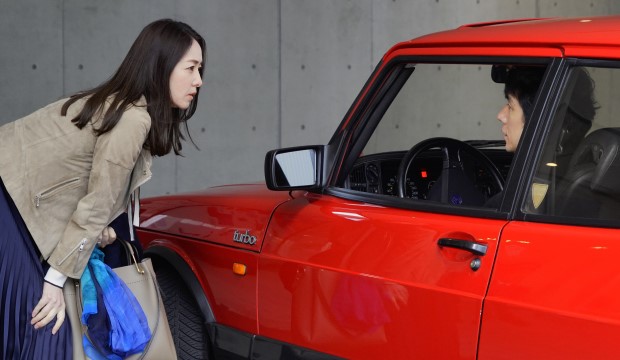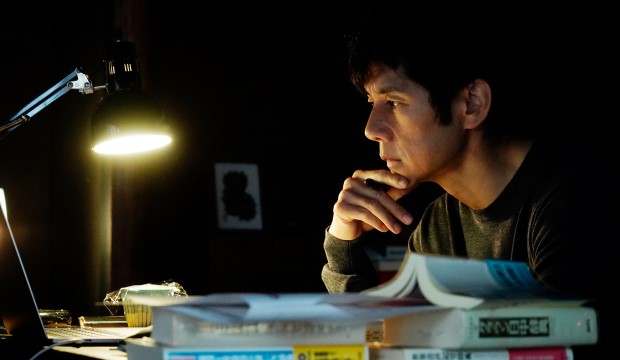Drive My Car review ★★★★★
Ryûsuke Hamaguchi's three-hour triumph lost Best Picture at this year's Oscars, but deserved better. A delicate odyssey through grief and storytelling, Drive My Car was the best film of 2021
Hidetoshi Nishijima and Tôko Miura in Drive My Car (Photo: MUBI)
Drive My Car won the Oscar for Best International Feature.
The 2022 Academy Awards will be remembered for a number of reasons. Ariana DeBose became the first queer woman of colour to win an Oscar. Troy Kotsur is the first deaf man to win Best Supporting Actor. Jane Campion is the first woman to win Best Director twice. Oh, and Will Smith slapped Chris Rock on stage (don't know if you heard). But there’s one slight this critic can’t forgive: Drive My Car not winning Best Picture.
There were some decent if predictable nominees this year, including the divisive winner CODA. But none of them can match Ryûsuke Hamaguchi’s dense, delicate, and eerie meditation on grief, the power of storytelling, and the foggy, unbearable mysteries in human beings.

Reika Kirishima and Hidetoshi Nishijima as Oto and Yusuke. Photo: MUBI
Drive My Car follows the widowed theatre director Yusuke Kafuku (Hidetoshi Nishijima), who makes multi-lingual productions of classic plays with actors speaking different languages to each other. Yusuke never satisfactorily explains the reasoning, but there’s a curious inclusivity to the method. It bonds people blocked by linguistic barriers, achieving the collective enjoyment of great art.
The first 40 minutes of a three-hour runtime are spent with Yusuke and his wife Oto (Reika Kirishima), a screenwriter who conjures stories after sex. They discuss them in detail: ideal for a writer/director relationship. But Oto has secrets, revealed to Yusuke by accident as he stumbles upon her misdeeds. He never confronts her. When she suddenly dies, Yusuke holds onto her fiction to posthumously interpret.
It’s only after this lengthy prologue that the opening credits start, allowing Hamaguchi and his co-writer Takamasa Oe enough space to set the ponderous tone.
Oto's invisible spectre hangs over the whole film. As Yusuke drives his red Saab 900, he listens to tapes of Oto dictating Uncle Vanya, which is his next project. He applies the same multi-lingual process to Chekhov's play, casting people across Asia from Japan to Taiwan. There's even a mute actress, Yoon-a (Park Yu-rim), who crafts a powerful performance through Korean Sign Language.
Unbeknown to Yusuke, the theatre company has a policy for its directors to be driven rather than drive themselves. This is when he meets Misaki (Tôko Miura), a quiet 23-year-old driver with smooth skills behind the wheel. The film splits between the slow and absorbing rehearsal process for Uncle Vanya and the passive, platonic relationship forming between Yusuke and Misaki.
Hamaguchi and Oe reveal personal histories in gradual pieces. Drive My Car is much like a puzzle box, an emotional Rubik’s Cube that can’t be solved. During a time of infinite social media personalities – people turned into brands, filling the feeds of millions – the ultimate unknowability of people is a refreshing, if gloomy, revelation to experience.

Photo: MUBI
The screenplay was based on a short story in Men Without Women, a collection by the excellently surreal author Haruki Murakami. But despite Drive My Car being one of Murakami's least weird works, Hamaguchi perfectly captures the writer’s haunting, existential atmosphere that radiates much of his fiction.
Both central performances from Nishijima and Miura as Yusuke and Misaki connect in transcendent silence, only interrupted when necessary. Their faces usually frown, but rarely break down. Whereas film as a medium often depends on unreal gestures as a shortcut to storytelling, Hamaguchi doesn’t settle for this. The words largely speak for themselves, making every scene feel genuine.
It’s mainly on-stage that Yusuke unveils his true self. At one point he says to his Uncle Vanya – the young, tricky and ominously cast Takashi (Toshiaki Inomata) – that Chekhov brings out the real person performing. Does that make the artifice of fiction more real than reality? It’s a testament to how art and life, despite having unique properties, shake and mingle like confluent waves upon the shores of human existence.
This critic has watched Drive My Car twice, and there are still several mysteries to uncover. Do any of the other Best Picture nominees achieve that?
Drive My Car is available now on digital platforms, and will be available on MUBI from Friday 1 April.
The 2022 Academy Awards will be remembered for a number of reasons. Ariana DeBose became the first queer woman of colour to win an Oscar. Troy Kotsur is the first deaf man to win Best Supporting Actor. Jane Campion is the first woman to win Best Director twice. Oh, and Will Smith slapped Chris Rock on stage (don't know if you heard). But there’s one slight this critic can’t forgive: Drive My Car not winning Best Picture.
There were some decent if predictable nominees this year, including the divisive winner CODA. But none of them can match Ryûsuke Hamaguchi’s dense, delicate, and eerie meditation on grief, the power of storytelling, and the foggy, unbearable mysteries in human beings.

Reika Kirishima and Hidetoshi Nishijima as Oto and Yusuke. Photo: MUBI
Drive My Car follows the widowed theatre director Yusuke Kafuku (Hidetoshi Nishijima), who makes multi-lingual productions of classic plays with actors speaking different languages to each other. Yusuke never satisfactorily explains the reasoning, but there’s a curious inclusivity to the method. It bonds people blocked by linguistic barriers, achieving the collective enjoyment of great art.
The first 40 minutes of a three-hour runtime are spent with Yusuke and his wife Oto (Reika Kirishima), a screenwriter who conjures stories after sex. They discuss them in detail: ideal for a writer/director relationship. But Oto has secrets, revealed to Yusuke by accident as he stumbles upon her misdeeds. He never confronts her. When she suddenly dies, Yusuke holds onto her fiction to posthumously interpret.
It’s only after this lengthy prologue that the opening credits start, allowing Hamaguchi and his co-writer Takamasa Oe enough space to set the ponderous tone.
Oto's invisible spectre hangs over the whole film. As Yusuke drives his red Saab 900, he listens to tapes of Oto dictating Uncle Vanya, which is his next project. He applies the same multi-lingual process to Chekhov's play, casting people across Asia from Japan to Taiwan. There's even a mute actress, Yoon-a (Park Yu-rim), who crafts a powerful performance through Korean Sign Language.
Unbeknown to Yusuke, the theatre company has a policy for its directors to be driven rather than drive themselves. This is when he meets Misaki (Tôko Miura), a quiet 23-year-old driver with smooth skills behind the wheel. The film splits between the slow and absorbing rehearsal process for Uncle Vanya and the passive, platonic relationship forming between Yusuke and Misaki.
Hamaguchi and Oe reveal personal histories in gradual pieces. Drive My Car is much like a puzzle box, an emotional Rubik’s Cube that can’t be solved. During a time of infinite social media personalities – people turned into brands, filling the feeds of millions – the ultimate unknowability of people is a refreshing, if gloomy, revelation to experience.

Photo: MUBI
The screenplay was based on a short story in Men Without Women, a collection by the excellently surreal author Haruki Murakami. But despite Drive My Car being one of Murakami's least weird works, Hamaguchi perfectly captures the writer’s haunting, existential atmosphere that radiates much of his fiction.
Both central performances from Nishijima and Miura as Yusuke and Misaki connect in transcendent silence, only interrupted when necessary. Their faces usually frown, but rarely break down. Whereas film as a medium often depends on unreal gestures as a shortcut to storytelling, Hamaguchi doesn’t settle for this. The words largely speak for themselves, making every scene feel genuine.
It’s mainly on-stage that Yusuke unveils his true self. At one point he says to his Uncle Vanya – the young, tricky and ominously cast Takashi (Toshiaki Inomata) – that Chekhov brings out the real person performing. Does that make the artifice of fiction more real than reality? It’s a testament to how art and life, despite having unique properties, shake and mingle like confluent waves upon the shores of human existence.
This critic has watched Drive My Car twice, and there are still several mysteries to uncover. Do any of the other Best Picture nominees achieve that?
Drive My Car is available now on digital platforms, and will be available on MUBI from Friday 1 April.
TRY CULTURE WHISPER
Receive free tickets & insider tips to unlock the best of London — direct to your inbox
| What | Drive My Car review |
| When |
28 Mar 22 – 28 Mar 23, ON DIGITAL PLATFORMS 01 Apr 22 – 01 Apr 23, ON MUBI |
| Price | £n/a |
| Website | Click here for more information |